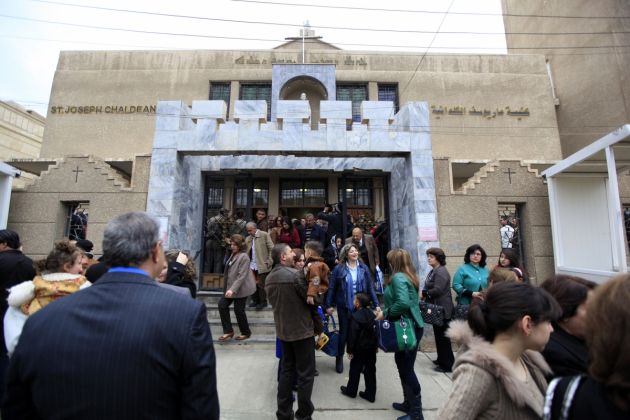Red lights to illuminate Rome's Colosseum for persecuted Christians

Red lights will illuminate the Colosseum in Rome later this month to draw attention to the persecution of Christians around the world, and especially in Syria and Iraq.
On Saturday, Feb. 24, at 6 p.m. the red spotlights that will flood the Colosseum will represent the blood of Christians who have been wounded or lost their lives due to religious persecution, Catholic News Agency reports.
https://www.catholicnewsagency.com/news/colosseum-to-be-lit-red-for-persecuted-christians-42868.
"Our aim is to break through the indifference, above all that of the international community, and to strive to ensure that after February 24th no one can continue to ignore the persecution of Christians," said Alessandro Monteduro, the director Aid to the Church in Need's Italian office.
He said martyrdom is not a thing of the past.
At a press conference in Rome, Feb. 7, Monteduro announced that the Colosseum - an ancient symbol of Christian martyrdom - will be lit up in red at 6 p.m.
At the same time, the Maronite cathedral of Saint Elias in Aleppo, Syria and the Church of Saint Paul in Mosul, Iraq will do the same.
In the Church of St. Paul, on Dec. 24, the first Mass was celebrated after the city's liberation from ISIS.
Present at the press briefing were Patriarch Louis Raphael I Sako, head of the Chaldean Catholic Church from Iraq, and Franciscan Father Firas Lutfi.
Lutfi is a parish priest at the Church of Saint Francis in Aleppo and is superior of the city's Franciscan community at Terra Sancta College.
Sako said: "Turning on the red light will bring hope to these people who suffered a lot. The Church in Iraq gives thanks to the Western Churches and the charities that made a miracle in Iraq."
Mantovano noted, "So many Christian communities around the world are suffering hunger, poverty and violence on account of their faith.
"On several occasions already, we have illuminated some of the most important monuments in the world in red to draw attention to the martyrdom of our Christian brothers and sisters.
"On this occasion, our intention is to also involve these communities directly, with the help of two of them that have suffered among the most in recent years, namely those in Syria and Iraq."
The event, sponsored by Aid to the Church in Need (ACN), follows a similar initiative last year, which lit-up London's Parliament building in red, as well as the Basilica of the Sacred Heart in Paris and the cathedral in Manila, Philippines.
In 2016, the famous Trevi Fountain in Rome was lit.
Monteduro, told journalists Feb. 7 that the "illumination [of the Colosseum] will have two symbolic figures: Asia Bibi, the Pakistani Christian condemned to death for blasphemy and whose umpteenth judgment is expected to revoke the sentence; and Rebecca, a girl kidnapped by Boko Haram along with her two children when she was pregnant with a third."
"One of the children was killed," he said, "she lost the baby she was carrying, and then became pregnant after one of the many brutalities she was subjected to by her captors."
Once she was freed and reunited with her husband, she decided she "could not hate those who caused her so much pain," Monteduro said.
Aid to the Church in Need released a biennial report on anti-Christian persecution Oct. 12, 2017, detailing how Christianity is "the world's most oppressed faith community," and how anti-Christian persecution in the worst regions has reached "a new peak."
13 COUNTRIES REVIEWED
The report reviewed 13 countries, and concluded that in all but one, the situation for Christians was worse in overall terms for the period 2015-2017 than during the prior two years.
"The one exception is Saudi Arabia, where the situation was already so bad it could scarcely get any worse," the report said.
China, Eritrea, Iraq, Nigeria, North Korea, Pakistan, Saudi Arabia, Sudan, and Syria were ranked "extreme" in the scale of anti-Christian persecution.
Egypt, India, and Iran were rated "high to extreme," while Turkey was rated "moderate to high."
The Middle East is a major focus for the report and it says, "Governments in the West and the U.N. failed to offer Christians in countries such as Iraq and Syria the emergency help they needed as genocide got underway.
"If Christian organizations and other institutions had not filled the gap, the Christian presence could already have disappeared in Iraq and other parts of the Middle East."
The exodus of Christians from Iraq has been "very severe."
Christians in the country now may number as few as 150,000, a decline from 275,000 in mid-2015.
In the early part of 2017 there were some signs of hope, with the defeat of the Islamic State group and the return of some Christians to their homes on the Nineveh Plains.
The departure of Christians from Syria has also threatened the survival of their communities in the country, including historic Christian centers like Aleppo, ACN said.
Syrian Christians there suffer threats of forced conversion and extortion. One Chaldean bishop in the country estimates the Christian population to be at 500,000, down from 1.2 million before the war.
Many Christians in the region fear going to official refugee camps, due to concerns about rape and other violence, according to the report.
